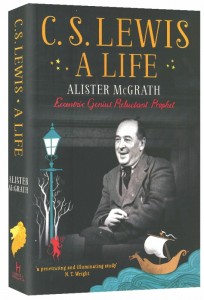Apostle to the skeptics: review of C.S. Lewis: A Life
C. S. Lewis: A Life, Alister McGrath, Hodder & Stoughton
Do we still need C S Lewis? The Narnia books are widely praised as the best of their genre, but as a Christian apologist, is Lewis still relevant? There are plenty of contemporary writers making the case for Christianity, from Tim Keller to Tom Wright and David Bentley Hart. Likewise, do we need yet another biography of Lewis? It certainly is an act of hubris on a writer’s part to suggest we have more to learn about Lewis’s life, especially following biographers of the calibre of A. N. Wilson. One must bring something new to the table, and Alister McGrath certainly does that.
Bringing his considerable skills of research and assessment, McGrath has combed the thousands of pages of letters recently made available, worked his way through Lewis’s personal library and critically compared what he found with popular assumptions about Lewis’s life (many of which come from Lewis himself, who is not the most reliable of autobiographers). For example, McGrath overturns the image of an anti-Christian Oxford, arguing that hostility to Lewis’s popularity was often justified, considering the adverse impact on his students. Also, Lewis’s prejudice against more recent literature as below his beloved medieval poetry was simply not in tune with Oxford’s changing standards. McGrath argues that Lewis’s relationships with his father and Mrs Moore (Lewis’s landlady and probably lover), and the effects of his war service were probably far more important than Lewis admitted. Lewis is remembered as a jovial extrovert, but some of his relationships were very odd, particularly those with the two most important women in his life. The brilliant but bumbling bachelor of popular portrayals does not quite square with the facts.
It is somewhat disingenuous for McGrath to repeat Lewis’s argument that books are more important than their authors, considering the delving McGrath does. He reads much of Lewis’s personal life into the books themselves, even when the purpose of much of Lewis’s writing seemed to be escape rather than self-revelation. Lewis’s conversion continues to fascinate, particularly for McGrath, one assumes, because of the similarities between Lewis and McGrath, and here again McGrath does some revision, sometimes to ridiculous lengths. (The flowering season of the English bluebell becomes critical to his arguments about the dating of Lewis’s conversion.) Lewis seemed to think his conversion was some kind of proof of God’s existence, as he felt pursued by God. But one may apply here McGrath’s observation that some of Lewis’s apologetic works seem logical on the surface, but fall short on closer inspection.
However, part of Lewis’s enduring appeal remains in his insistence that faith is logical and reasonable, and that we all share a longing for something bigger than ourselves (again, for Lewis, a proof of God’s existence), a longing strongly evident in Lewis’s life, and in works like Pilgrim’s Regress. Here Lewis reflects the Platonic side of Christianity. As other biographers have noted, Lewis saw stories as pointing to a reality less dark and cloudy than our present existence. His readers, and Christians more generally, want to feel part of a bigger story, even if critics see this as merely an evolutionary or Freudian survival strategy.
At the height of his fame Lewis was dubbed the “apostle to the skeptics”, but he later developed doubts about his status as an apologist. To be fair, he was thrust into the role despite his misgivings. McGrath, sympathetically argues that some of the arguments in Mere Christianity are unconvincing for non-believers, but are comforting to believers. This, too, seems to be the current status of Lewis’s appeal. It is generally evangelical Christians, rather than fence-sitters, who read him. This is understandable in the context of the New Atheism debate, where Christianity’s “reasonableness” is under fire. As to whether the current ascendency of his star is justified, perhaps Lewis should have the last word. For him, literature’s worth should be judged largely on its longevity, and one could argue that Lewis’s books are now firmly in the realm of the classics.
Nick Mattiske works in publishing and is the author of Notes on Books and Music (Mosaic Press).
Email This Story
Why not send this to a friend?



